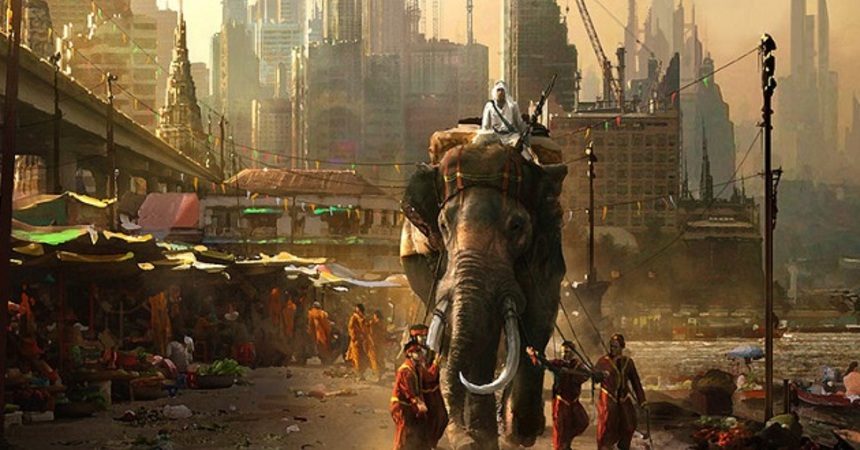Books to be Scene: Paolo Bacigalupi's THE WINDUP GIRL

The sun peers over the rim of the earth, casting its blaze across Bangkok. It rushes molten over the wrecked tower bones of the old Expansion, engulfing them in light and heat. It ignites the sharp high roofs of the Grand Palace where the Child Queen lives cloistered with her attendants, and flames from the City Pillar Shrine where monks chant 24-7 on behalf of the city's seawalls and dikes.What's on your mind, Mister Lee?
[...] It's difficult not to be always aware of those high walls and the pressure of the water behind. But the Thais are stubborn and have fought to keep their revered city from drowning. With coal-fired pumps and leveed labor and a deep faith in the visionary leadership of their Chakri Dynasty, they have so far kept at bay that thing which has swallowed New York and Rangoon, Mumbai and New Orleans.
People say they watch movies to be transported, to go someplace else for an hour or two, but how often is it a film actually feels as if it's taken you to another world? No matter how bizarre the set dressing countless fantasy and science fiction pictures, famous or infamous, still operate under a recognisable framework. We can label the characters almost instinctively, knowing the filmmakers could transplant the basic story into some other milieu with the bare minimum of effort, or have already done, even, consciously or unconsciously lifting their plot wholesale from the most obvious templates going. Inception is a heist film under that cataclysmic dreamscape. Looper is a tragic film noir (it's definitely not about time travel, for starters).
Jumping the rails for a moment, how many genre films seriously explore adult material without dipping into the exploitation playbook? How many of them can handle excess in a way that suggests it's actually intrinsic to their storyline, without turning into full-on fanservice? Obviously there are plenty of mundane reasons for this. Your hypothetical Saturday filmgoer clutching a bucket of popcorn tends not to want anything down and dirty to jar them out of an afternoon's relaxation. Titties and splatter are for the howling crowds at midnight festival screenings, or an evening in front of the TV trying to let off some steam - wanting to forget the crushing malaise left over from yet another day scurrying round your cubicle working the 9 to 5.
And you're thinking of something that tackles both these points?
Paolo Bacigalupi's brilliant The Windup Girl is a novel that does its level best to buck both these trends. It takes place on an Earth where sweeping environmental changes have violently upended the natural order and almost every law, implicit or explicit, has been scrubbed out and re-written. This is a world where virtually anything is for sale, where life is almost universally Hobbesian and neither money nor power can guarantee you any different. But the terrors the characters have to live with and the grinding indignities they suffer are explicitly a reflection of who they are - their circumstances, how others see them, and how they behave as a result. (Very little of anything anyone does in Inception has to do specifically with their creeping around inside anyone's subconscious.)
After a ruinous financial collapse and widespread catastrophe global trade in Bacigalupi's future has all but dried up, and those countries still functioning as any kind of power worth reckoning have done so by walling themselves off from the outside world and strictly governing any traffic across their borders. Genetic engineering is out of control, and people live in fear of lethal infections burning through one crop species after another if they're left unchecked, killing anyone desperate enough to eat them. Corporations and nation states alike jealously guard the genetic code and untainted seedbanks that guarantee their dependants' survival for a few more decades, at the same time they send their spies to try and uncover any hitherto undiscovered stock from the old world.
So who lives in a place like this?
Anderson Lake is one of these spies, an undercover agent for a American corporation sent to Thailand poke through Bangkok back alleys for exotic foodstuffs that survived the cataclysm - or better still a way into the Thai seedbank. His staid routine is thrown out of whack when he meets Emiko, the windup girl of the title. Emiko is one of the New People, a genetically engineered race grown in Japanese labs to be perfect, subservient companions, modelled after a doll-like feminine ideal. Her presence in Bangkok unsupervised is illegal - she'd be shot on sight should anyone find her. Emiko's path crossed Anderson's when it turns out she has information that might help his mission, but when she begs him for help he can't resist, despite the danger.

Few fantasy universes are as astonishingly, wonderfully alive as Bacigalupi's Earth, for all it's been laid to waste. His image of Bangkok as the eye of the hurricane is utterly entrancing from the first few pages, an alien, crumbling metropolis holding back the ocean behind towering levee walls needing constant maintenance. The city's densely packed clutter, and the sense of constant activity at every level from the haves to the have-nots is reminiscent of top-drawer crime drama - not least Hong Kong gangster flicks showing the view of those towering tenement buildings from down in the gutter. And there are so many references to heat and perspiration (whether it's in connection with ennui or eroticism) the man's prose practically shimmers.
You did mention sex and violence, yes.
Emiko, abandoned by her former master, is trying to work off an ever-increasing debt in a British expat's seedy club where she's roped into lurid floorshows for the small handful of tourists or gawkers trawling the city's underbelly. But Bacigalupi never makes this feel like the usual view of Bangkok as a den of exotic vices dreamt up by them heathen Asiatics. The windup girl is bred to please regular humans; part of her character arc involves Emiko learning she doesn't have to despise herself for enjoying - on some level - the things that are done to her, and that she can still take pleasure for herself elsewhere without feeling that every choice she makes is a matter of master and servant. When Emiko then discovers she's far from defenseless, her choices branch out even further.
The Windup Girl has the epic sweep of all Bacigalupi's work thus far, but his other novels in the same setting are aimed at teenagers and it's striking how toning down the more adult elements robs the narratives of a lot of their emotive power. The Drowned Cities and its story of child soldiers roped into the regional fighting across the post-apocalypse feels authentic, but horribly didactic - Johnny Mad Dog this ain't. It's only when he acknowledges how far people are driven by their more primal emotions that his plotting really catches fire, be those harsh or more gentle. The Windup Girl is a very sensual love story about a man who wants to protect a woman who's not entirely human, and how that woman may not need protecting after all: it's also (moderate spoilers!) about how their relationship helps spark off a war.
I'm guessing filming this one would not be easy?
You'd have to throw a fortune at any movie adaptation of The Windup Girl to get it to work: at the very least it'd need some spectacularly high-end CG to get the illusion of otherworldliness right. The action travels from ground level to way above the city, and from intimate two-handers to full-on battle scenes. At the same time many of Bacigalupi's sprawling cast of characters and sub-plots could be comfortably trimmed down without losing too much of the richness of his Bangkok - you could even argue that focusing on the larger roles would add to the impact on the viewer of just how fantastical the place is. Any FX director could easily make a name for themselves as a visual storyteller if they successfully conveyed even a fraction of the breadth of the imagination in this book.
It'd probably never live up to the sheer physicality of the source. The sex would scare off a lot of prospective backers even if they were willing to put up the money, and you'd never get a blockbuster genre picture pushing the violence quite this hard - again, multiplex crowds don't like to be reminded we're all meat under the skin. But the magic of The Windup Girl is so heady you half wish someone would try anyway, if only to have a genre film for grownups which didn't merit that label solely by virtue of not insulting our intelligence. Bacigalupi's fragile city is an absolutely intoxicating blend of danger, sex and sweat leavened by a beautiful grasp of dynamics and some astonishing feats of imagination, and as brilliant as the novel is good God do I want some lucky director to let me go to there.
The Windup Girl, by Paolo Bacigalupi, is available in paperback, hardback and ebook editions, published by Night Shade in the US and Orbit in Europe.
Images taken from Raphael Lacoste's original cover artwork for the novel.

Do you feel this content is inappropriate or infringes upon your rights? Click here to report it, or see our DMCA policy.






